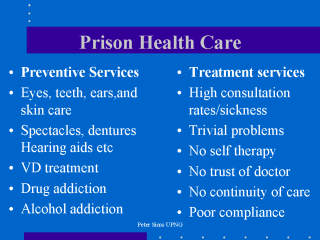| front |1 |2 |3 |4 |5 |6 |7 |8 |9 |10 |11 |12 |13 |14 |15 |16 |17 |18 |review |
 |
On first arrival
there is the indignity of stripping, disinfecting and medical examination to exclude
infectious diseases, severe mental distress and risk of suicide. Prison life is boring, people have no access to simple domestic remedies for headache, cough etc. and thus they seek medical care frequently.Prisoners are not allowed to self medicate so they may attend two or three times daily for regular drugs for asthma or diabetes. Overcrowding, poor sanitary facilities, an inadequate diet and poor accommodation-too hot in summer and too cold in winter make for outbreaks of infectious disease.Typhus was also known as Jail fever, today TB is a major problem in the prisons of the former Soviet Union despite the fact that DOTS should be easier to organise in prison. Prisoners hoard their medicines, swap and sell them, have incomplete courses of treatment, move to another prison or finish their sentence halfway through a course of treatment. The doctor -patient relationship is different and difficult, the doctor’s first obligation is to the Prison authority and not to the prisoner, confidentiality is impossible and trust unlikely. Yet when someone is admitted to Prison it may be the first time in their life that they have had access to medical care in a structured way e.g. dental checks, a chest x-ray or anyone has taken interest in their health.They can be treated for chronic disease e.g BP, be referred for surgery e.g hernia repair and helped with alcohol and drug problems. |
| front |1 |2 |3 |4 |5 |6 |7 |8 |9 |10 |11 |12 |13 |14 |15 |16 |17 |18 |review |